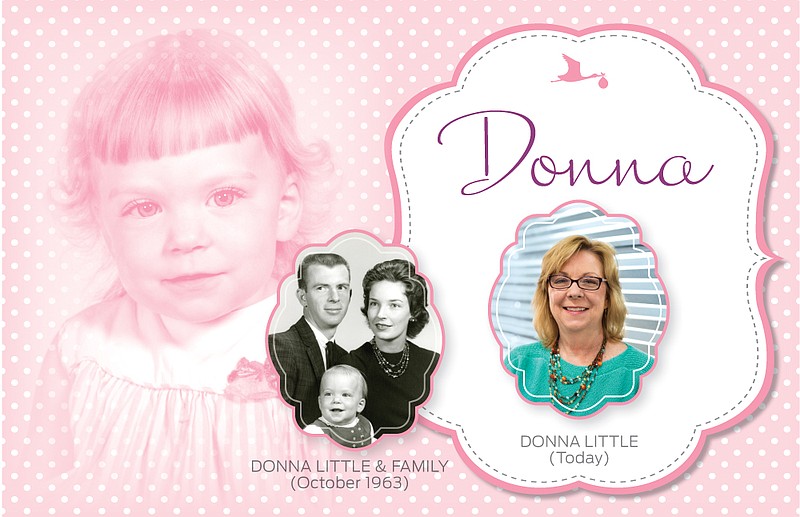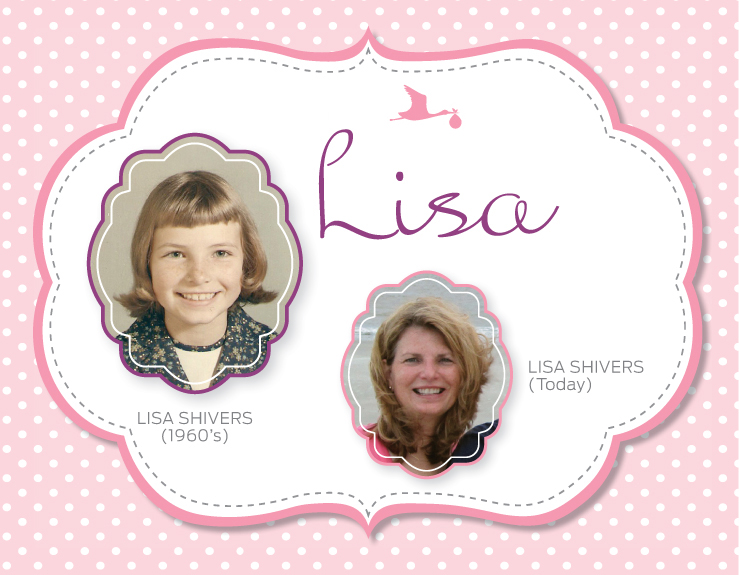Growing up in Birmingham, Alabama, Donna Brown Little wished she had been named after her mother, Drucilla.
"I would have liked to be Dru," says Donna, 54.
But her mother hated the name, Donna says. In fact, when her mother began elementary school, she asked to be called Judy instead. "She's 77 years old and still goes by Judy," says Donna, whose first name was selected from a baby name book in the early 1960s.
From 1960 to 1969, "Donna" was among the 10 most popular names for baby girls in the United States, according to ssa.gov/babynames, a government website that lets people search baby name data by state, birth year or decade. From 1940 to 1949, the decade when Donna's mother chose her new name, "Judy" and "Judith" were among the 15 most popular female names, according to the Social Security Administration.
A search of 2015's top baby girl names, the most recent government data available, shows that "Donna," "Judy" and "Judith" no longer rank among the 500 most popular names.
So why do some names fall out of fashion?
"Put bluntly, they're 'mom names' now," says Sherri Suzanne, founder of My Name for Life, a New York-based baby-name consulting practice. "New names arrive with fresh sounds, making others sound old." For example, when she was growing up during the latter part of the 20th century, "only grandmas were called Evelyn, Lillian, Audrey, Eleanor and Hazel," Sherri says.
But since the 1980s, those "grandma" names have been steadily cycling back into popularity. "Evelyn" jumped from No. 288 in 1980 to No. 15 in 2015, while "Hazel" leapt from No. 942 in 1998 to No. 63 in 2015.
"To today's parents, such names feel fresh," Sherri says.
But naming trends are about more than the crispness of a name's sound. Trends are also influenced by cultural and social factors - from shifting demographics to changing social norms.
Chattanooga resident Lisa Shivers, 59, says she was born in an era that valued manners and convention.
"It was the age of going with the flow," says Lisa, who supposes that is why parents of the baby-boom tended to choose short, easy-to-pronounce names - like "Lisa," which was the No. 1 most popular baby name for girls throughout the 1960s. But Lisa explains that for her mother, Georgiana Augusta, the decision to name her baby "Lisa" was also personal. Lisa remembers how her mother bemoaned having to write out her seven-syllable name.
"That's why she named me Lisa Ann. It was the shortest you could get," Lisa says.
"We don't think twice nowadays when we hear a parent call out a long, feminine, polysyllabic 'a'-ending name like Isabella or Olivia. But in the [1960s] such names may have been seen as a bit frilly and elaborate," Sherri says.
Across decades - centuries, even - female names have tended to fluctuate more than their male counterparts. For instance, "Michael" has remained within the top 50 male names since 1880. For four consecutive decades, 1960 to 2000, it was the No. 1 most popular name for a boy. In 2015, it had fallen only to No. 7.
" In my experience," Sherri says, "parents are traditionally somewhat less adventurous and more conservative with names for boys." She attributes this phenomenon to that fact that historically, men were expected to become breadwinners and " perhaps, being successful meant fitting in," she says.
Of course, there is also the tradition of men passing their name from generation to generation, she adds.
That was the case for Richard Schwarz, 62, of Ooltewah, Tennessee, who was named after his father. In the 1950s, "Richard" was the seventh-most popular name for a boy, though Richard went by "Ricky" as a child.
"I wanted my own identity," Richard says.
But as he got older, he began to appreciate his namesake. His father had been the respected head of the history department at Andrews University in Michigan. "I think I got treated better because of my dad," says Richard, who honored his father's legacy in more ways than one: First, he also became a university professor. Second, he also named his son Richard. "Now I'm Rick and he's Ricky," he says.
Today, nationally speaking, the top three boy names are Jacob, Noah and Mason. The top three girl names are Sophia, Emma and Isabella. Ten years ago, the top three boys names were Jacob, Michael and Joshua; the top girl names were Emily, Madison and Emma.
"Despite the fact that the top 10 names seem gender-specific, unisex names continue to grow," Sherri says. One emerging trend, she says, is the use of English surnames as first names: Rowan, Carter or Collins, for example. And of course, there is the cyclical trend of recycling vintage names: Zelda or Sophia for girls; Walter or Otis for boys.
But, according to Sherri, this most recent wave of fresh-again names features hints of Old Hollywood. Which may not be surprising since pop culture overwhelmingly influences modern naming trends, says Sherri.
Centuries ago, the primary influences were family tradition and religion. But, "Nowadays, most name trends start with movies, TV, books or video games. All it will take is for a celebrity to name their child 'Lisa' and it may be back," Sherri says.

